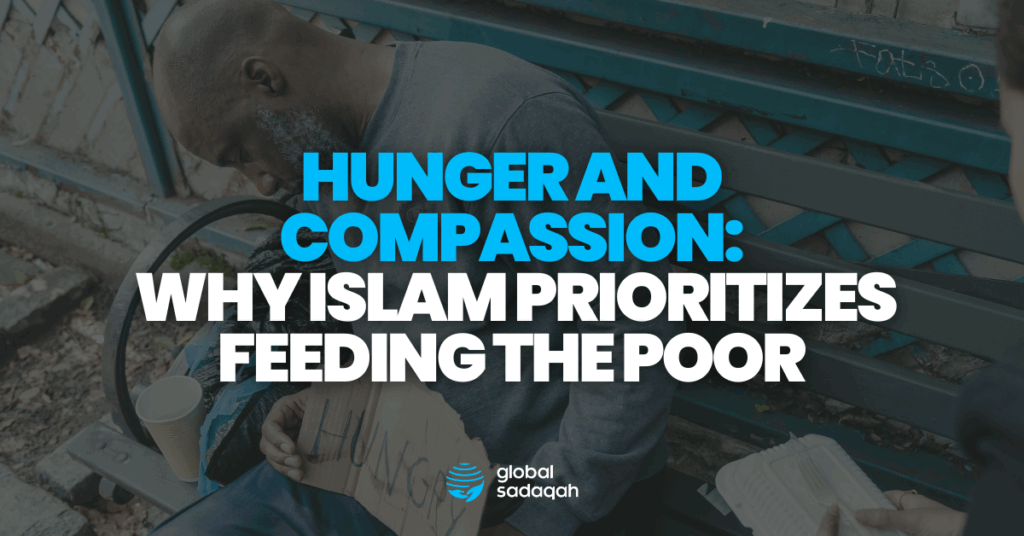Introduction
Hunger is one of the deepest struggles a human being can endure. It is not just the absence of food, but a condition that weakens the body, clouds the mind, and crushes the spirit. To go to sleep with an empty stomach while others feast nearby is among the most painful forms of deprivation.
Islam recognizes this reality and places extraordinary emphasis on hunger relief as an act of faith, compassion, and justice. The Qur’an and Sunnah teach that caring for the hungry is not optional—it is a responsibility that reflects the very essence of being Muslim. To feed others is to embody mercy, to imitate the example of the Prophet ﷺ, and to fulfill the trust Allah has placed in our wealth and blessings.
Hunger in the Qur’an: A Test of Faith
The Qur’an often describes hunger as both a trial and an opportunity for believers. Allah reminds us that He tests His servants with both prosperity and scarcity:
“We will surely test you with something of fear and hunger and a loss of wealth and lives and fruits, but give glad tidings to the patient.”
(Surah Al-Baqarah, 2:155)
At the same time, Allah praises those who respond to hunger not by turning away, but by sharing their provisions:
“And they give food in spite of love for it to the needy, the orphan, and the captive, [saying], ‘We feed you only for the countenance of Allah. We wish not from you reward or gratitude.’”
(Surah Al-Insan, 76:8–9)
This verse shows that the act of feeding is most noble when it is done out of sincerity, without expectation of thanks. The Qur’an places feeding the poor at the heart of faith, making it a mark of those who truly live for Allah.
The Prophetic Example of Generosity
The Prophet Muhammad ﷺ was known for his generosity, particularly in feeding others. His home was never a place of selfish consumption but of shared meals and open doors. Numerous narrations highlight this:
- “Feed the hungry, visit the sick, and free the captive.” (Bukhari)
- “He is not a believer whose stomach is filled while his neighbor to his side goes hungry.” (Bayhaqi)
- When asked about the best deeds, the Prophet ﷺ replied: “Feeding the hungry and greeting those you know and those you do not know.” (Bukhari and Muslim)
Even when he had little, the Prophet ﷺ would share what he had. His generosity in feeding others was not seasonal or occasional—it was a lifestyle that reflected the mercy of Allah in human form.
Why Islam Prioritizes Hunger Relief
1. Preserving Human Dignity
Hunger humiliates a person by forcing them to beg or endure suffering in silence. Islam recognizes that every human being has dignity, and feeding them restores honor and hope.
2. Strengthening the Ummah
Food is not just nutrition—it is a bond. When Muslims share meals, barriers between rich and poor, locals and strangers, dissolve. The Prophet ﷺ said:
“Eat together and do not eat separately, for the blessing is in being together.” (Ibn Majah)
3. Wealth as a Trust
In Islam, wealth does not belong fully to the individual—it is a trust from Allah. Through zakat, sadaqah, fidyah, and kaffarah, Allah channels wealth towards hunger relief. These are not optional extras but divinely ordained systems ensuring that no one is left hungry.
4. Spiritual Growth and Eternal Reward
Feeding others purifies the soul and earns immense reward. The Prophet ﷺ said:
“Whoever gives food to a fasting person to break his fast will have a reward like his, without detracting from the reward of that person in the slightest.” (Tirmidhi)
Even giving a single date or a sip of water can be multiplied by Allah into mountains of reward.
Hunger in Today’s World: A Call to Action
Despite advancements in technology and global wealth, hunger remains one of the world’s greatest challenges. According to international reports, hundreds of millions of people go to bed hungry every night. For Muslims, this is not just a humanitarian crisis—it is a test of our faith and our unity as an ummah.
Islam calls for both immediate relief and long-term solutions. While food banks, Ramadan iftar programs, and community kitchens provide short-term help, there is also a need for sustainable projects: community farming, job creation, and education. Feeding the hungry is the first step, but empowering them to escape hunger permanently is the fuller realization of Islamic compassion.
Practical Ways Muslims Can Revive This Sunnah
- Support Local Food Banks and Kitchens – donate food regularly to local initiatives.
- Share Your Meals – revive the Sunnah by inviting neighbors, co-workers, or the needy to your table.
- Give Regularly in Charity – even small amounts given consistently can support hunger relief projects worldwide.
- Distribute Iftar in Ramadan and Beyond – don’t restrict generosity to Ramadan; make it part of your family’s culture.
- Be Mindful of Waste – Islam condemns extravagance. Reducing food waste means more food for those who need it.
Conclusion
In Islam, feeding the hungry is not a side act of kindness—it is central to living as a believer. Hunger relief reflects the mercy of Allah, revives the Sunnah of the Prophet ﷺ, and strengthens the bonds of community. By prioritizing hunger relief, Muslims affirm that faith is not confined to prayer and fasting but shines brightest in service to others.
As the Qur’an reminds us, the most sincere servants of Allah are those who give food with no expectation of reward—only seeking the pleasure of their Lord. In a world where so many still suffer hunger, every believer has an opportunity to embody this mercy and bring light to those in darkness.

